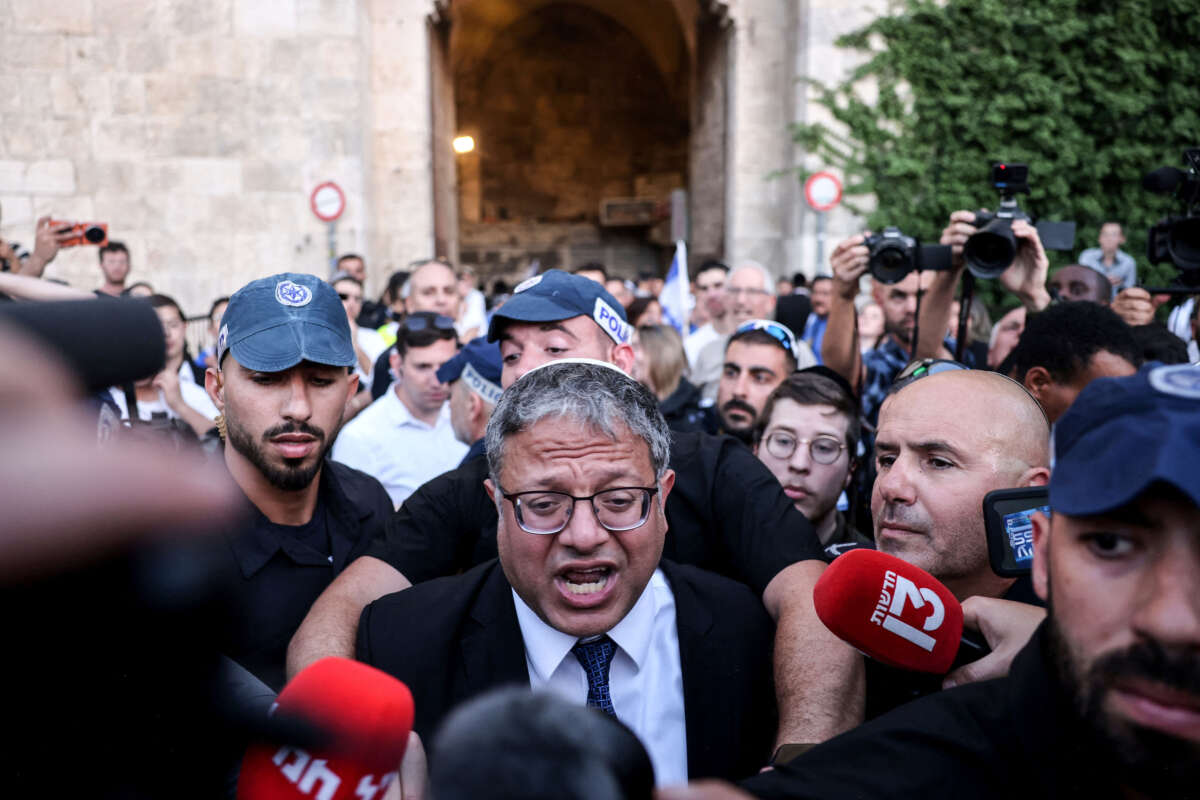Humanitarian aid deliveries to Gaza remained almost entirely halted by Israeli forces on Friday, but Israel’s national security minister, Itamar Ben-Gvir, suggested he was dissatisfied with the mounting death toll from starvation and called for a complete blockade to be resumed.
“In our opinion Israel should withhold fuel from Gaza and reduce the humanitarian [aid] that enters,” Ben-Gvir said on social media, adding that he would not support a cease-fire deal put forward by Israel because it “would endanger the future of the state of Israel.”
Ben-Gvir’s comments came as just two crossings into Gaza were open — the Western Erez crossing from Israel into the northern part of the enclave and the Karem Abu Salem crossing, which has had “limited functionality” since May 8.
In recent days the number of aid trucks that have entered through the Karem Abu Salem crossing has plummeted from nearly 200 per day in early May to fewer than 50 per day, with as few as just one truck per day entering since mid-May.
With the Rafah crossing closed to all aid shipments since the Israel Defense Forces (IDF) launched a full-scale invasion of the southern city on May 6, deliveries through the Karem Abu Salem entry point is the best chance that people in Rafah and southern Gaza have for obtaining desperately needed relief.
More than 1 million Palestinians have been displaced to Rafah since Israel began its bombardment of Gaza in October, and the United Nations has said that roughly that number have again fled the city in the past month, trying to escape Israel’s incursion.
More than 36,000 Palestinians have been killed in Israel’s attacks since October, including at least 30 children who have died of starvation. Nearly all of them died in northern Gaza, where World Food Program Executive Director Cindy McCain said “full-blown famine” had taken hold last month.
Along with Israel’s closure of border crossings, Doctors Without Borders said this week that the “systematic obstruction at Israeli-controlled crossing points” has kept trucks from reaching people who need relief. Israeli officials have turned away deliveries that include certain items, like medical kits, that they say could have a “dual use.”
Louise Wateridge a communications officer for the United Nations Relief and Works Agency for Palestine Refugees in the Near East (UNRWA), toldCNN on Friday that intense military action has kept the Karem Abu Salem crossing from operating fully, leaving trucks full of relief deliveries stuck on the Israeli side.
“It’s just a complete waste of vital humanitarian aid, and it’s such a manmade situation,” Wateridge told the outlet.
Amid the ongoing starvation crisis, Ben-Gvir’s call to even further reduce humanitarian aid came a day after he said in a video posted to social media that Israel intends to “occupy all the land” in Gaza, establish settlements like those in the West Bank, and encourage the so-called “voluntary migration” of Palestinians from Gaza — echoing a call from Prime Minister Benjamin Netanyahu which rights advocates denounced as an open endorsement of ethnic cleansing.
BREAKING: Ben Gvir, Minister of National Security, confirms Israels intent to fully Occupy Gaza, establish settlements, and displace Palestinians.
— Khalissee (@Kahlissee) June 6, 2024
We knew this all along. It was never about Hostages or Hamas. pic.twitter.com/dDg0f0uqD6
Ben-Gvir has opposed a cease-fire deal supported by U.S. President Joe Biden, which calls for Israel’s withdrawal from population centers in Gaza, a release of hostages by Hamas in exchange for the release of hundreds of Palestinian detainees held in Israeli prisons, and Israel’s eventual withdrawal from the enclave entirely.
One researcher on Wednesday objected to Ben-Gvir’s portrayal in corporate media reports as a far-right extremist figure who is pushing Israel’s government toward a fringe movement.
“It’s time for people to stop calling [Finance Minister Bezalel] Smotrich, Ben-Gvir, and Netanyahu ‘fringe,'” they said. “They’re not fringe. They’re quite literally the figureheads of the Israeli establishment.”
Our most important fundraising appeal of the year
December is the most critical time of year for Truthout, because our nonprofit news is funded almost entirely by individual donations from readers like you. So before you navigate away, we ask that you take just a second to support Truthout with a tax-deductible donation.
This year is a little different. We are up against a far-reaching, wide-scale attack on press freedom coming from the Trump administration. 2025 was a year of frightening censorship, news industry corporate consolidation, and worsening financial conditions for progressive nonprofits across the board.
We can only resist Trump’s agenda by cultivating a strong base of support. The right-wing mediasphere is funded comfortably by billionaire owners and venture capitalist philanthropists. At Truthout, we have you.
We’ve set an ambitious target for our year-end campaign — a goal of $250,000 to keep up our fight against authoritarianism in 2026. Please take a meaningful action in this fight: make a one-time or monthly donation to Truthout before December 31. If you have the means, please dig deep.
